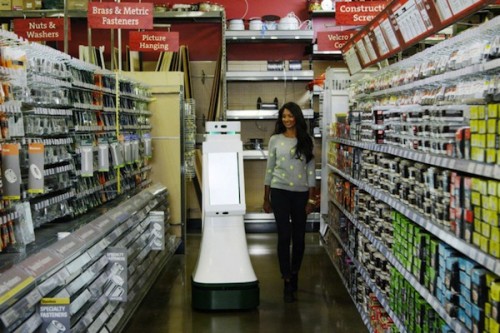WaPo Suggests Presidential Candidates ’Reckon with Robots’, but Ignores Resulting Need for Less Immigration
02/19/2015
With mainstream media, you are lucky to get half a loaf, and a recent Washington Post item is a prime example. The piece noted how the increasing use of smart machines performing complex workplace tasks has been negatively affecting employment, and automation should therefore be a matter of public debate in the upcoming Presidential campaign.
That’s the good part. But there’s no mention that the automation revolution means importing millions of immigrants to fill jobs done by retiring boomers is unnecessary because a future labor shortage isn’t happening.
Plus, adding so many immigrants may cause potentially explosive social consequences, assuming the diverse underclass becomes even larger and angrier over the lack of jobs. Does Ferguson ring a bell?
Oxford University researchers estimated in a 2013 report that “about 47 percent of total US employment is at risk” to be replaced by smart machines.
Below, robots can do customer service, like Orchard Supply Hardware’s greeter bot that can guide shoppers to desired merchandise.

Smart machines are everywhere, doing things you never imagined. Jobs are disappearing in small numbers here and there so we hardly notice.
One example. Remember going to the local pizza joint and watching Tony toss and spin the dough? Forget it — Tony’s job is toast in the brave new automated future. Check out the fresh pizza vending machine in Italy:
Actually, the Post piece did touch upon immigration, mentioning that employers might address “breaking down barriers” and “attracting more high-skilled immigrants.”
It’s time for presidential candidates to reckon with robots, Washington Post, February 17, 2015Presidential candidates have been arguing for more than two decades now about whether free trade is hurting middle-class workers. In 2016, they may launch a similar debate about robots and computers. As campaign demons go, automation may be the new outsourcing.
Technological advancements are making it easier for companies to buy software or machines to handle tasks once performed by people. That’s true in traditional blue-collar bastions of middle-class work, such as manufacturing, but also increasingly in higher-skill white-collar sectors such as accounting.
Experts divide sharply on whether this is good or bad for the U.S. economy. Techno-optimists predict big breakthroughs that create good jobs that would be as unimaginable today as “auto worker” was in the late 1800s. Pessimists forecast an economy where only a small slice of workers have the skills and education to stay ahead of the automation wave.
Where almost everyone agrees is that the phenomenon is growing, and that helping already strained middle-class workers adjust to it calls for big policy debates over education, entrepreneurship and the social safety net.
Which is to say, robots, as a political issue, could be ripening in time to snag a lead role in the economic debate of this campaign.
A new paper from economists at the Hamilton Project at the Brookings Institution sums up the tension nicely: “As rapidly advancing computer power and automation technology change the nature of work and the future of the economy,” Melissa Kearney, Brad Hershbein and David Boddy write, “our nation will face new and pressing challenges about how to educate more people for the jobs of the future, how to foster creation of high-paying jobs and how to support those who struggle economically during the transition.”
Hamilton will host a forum on the topic Thursday in Washington, featuring a parade of high-profile economists including Larry Summers of Harvard, Laura Tyson of the University of California-Berkeley, David Autor of MIT and John Haltiwanger of the University of Maryland. It will also include the authors of a best-selling book on the subject, “The Second Machine Age” — MIT professors Erik Brynjolfsson and Andrew McAfee.
In an interview last week (from snowbound Boston), Brynjolfsson and McAfee called technology the “biggest single force” behind the economic trends of the last decade, which saw included historically weak job creation and declining real household median incomes. They said they expect the changes over the next decade to be bigger — but not necessarily worse, for the middle class.
“We think technology should be considered the greatest gift we have,” Brynjolfsson said. “We don’t see it as the villain here, but what we keep in mind is, historically and today, technology doesn’t necessarily make society better or worse. It can go either way. It’s in our hands.”
So how could you harness job-killing technology for good? The pair suggest several “basic toolkit” policies, which, it will not surprise you, sound like things candidates often praise but rarely make big progress on, including improved education, breaking down barriers to creating new businesses, investing more in infrastructure and basic research and attracting more high-skilled immigrants.
They also raise an idea that might remind you of the big free-trade debates: that workers, and politicians, should make peace with the idea that some good jobs will go away, when technology renders them obsolete.
“What I hope doesn’t happen,” McAfee said, “is that this turns into a conversation about, who can bash technology and try to maintain the middle class and preserve the economy in amber.”
The problem with that is, a lot of workers who lost jobs from automation (or outsourcing, for that matter) in the last decade are still waiting for better jobs to come along. What to do with those workers, particularly older ones, is one of the most vexing questions policymakers face. Improved skill training could be part of the solution, Brynjolfsson and McAfee say.
But they also suggest, longer term, that as countries get richer, their safety nets grow. The implication is, maybe America will eventually need a bigger one.
That sounds like a whole other campaign fight, entirely. A big one.
